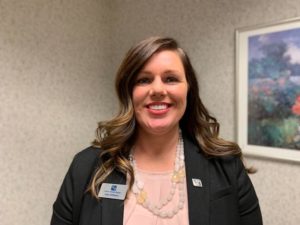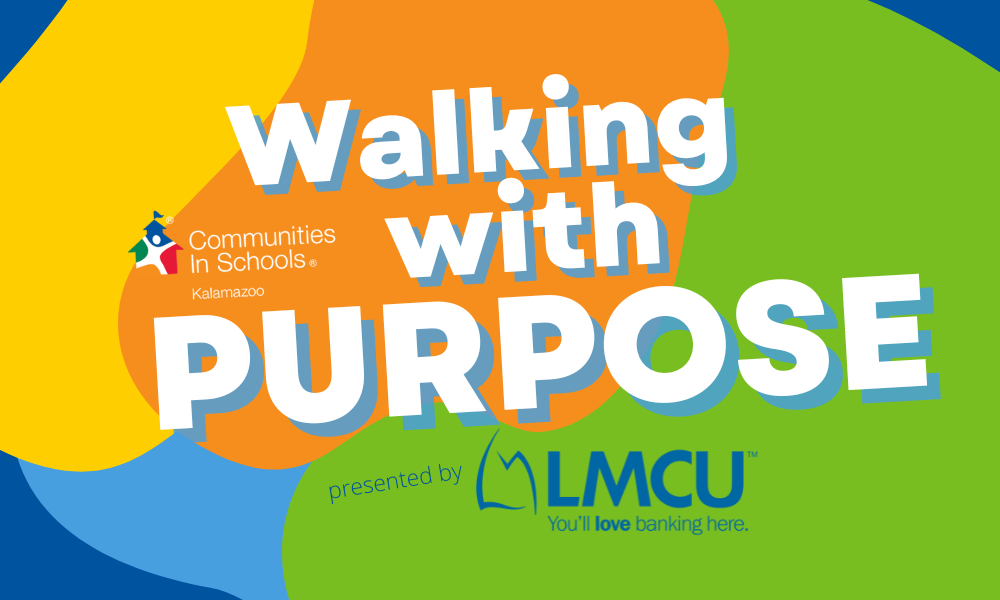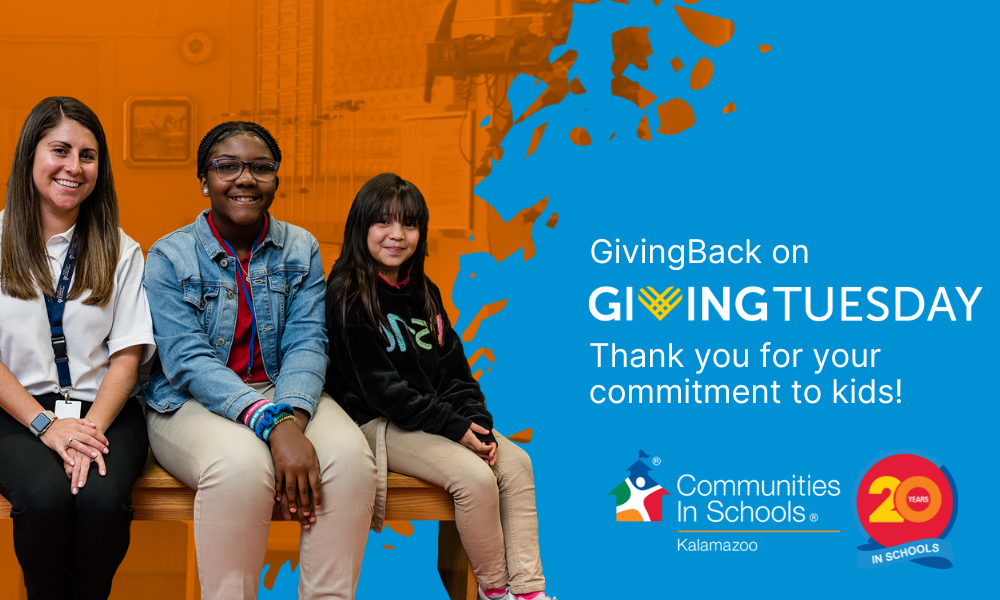 Welcome back to the POP QUIZ! This is a regular, yet totally unexpected, feature where we ask students, parents, staff, our friends, and partners to answer a few questions about what they are learning, reading, and thinking about. Today we feature Sara Williams, Vice President/Financial Center Manager III with Fifth Third Bank. She’s also stepping into her third year of service as a CIS Board Member, although, as you’ll soon learn, she has been involved with CIS since 2011.
Welcome back to the POP QUIZ! This is a regular, yet totally unexpected, feature where we ask students, parents, staff, our friends, and partners to answer a few questions about what they are learning, reading, and thinking about. Today we feature Sara Williams, Vice President/Financial Center Manager III with Fifth Third Bank. She’s also stepping into her third year of service as a CIS Board Member, although, as you’ll soon learn, she has been involved with CIS since 2011.
Sara grew up in Otsego and for the past 26 years has called Kalamazoo home. She lives with her husband Kevin, their 12-year-old daughter, one cat, and a dog. Her 24-year-old daughter recently graduated from Western Michigan University and is working as a rehabilitation specialist. Sara is also a proud grandmother to 2 ½ year old Oakli.
With a degree in finance from Davenport University, Sara’s career has always revolved around banking. She started out as a licensed personal banker at Bank One (now Chase) and for the past 20 years has been in management.
She is passionate about CIS and helping kids succeed in school. “I know community support can make all the difference,” she says. In fact, it’s this very philosophy of building stronger communities that drew her to Fifth Third Bank, which partners with CIS in several ways. Most recently, Fifth Third supported the annual Bundle Up project by serving as a host site at seven of their locations, making it convenient for the community to drop off a needed item or two. [More about Kalamazoo Rotaract’s Bundle Up project and how it helps our 12,000+ kids, here.]
On the home page of Fifth Third Bank’s website, it states, We love rolling up our sleeves and helping out our neighbors. Sara Williams, as you’ll soon learn, embodies this philosophy.
Alright, Sara: pencil out, eyes on your own paper. Good luck.
Pop Quiz
You were involved with CIS before you became a board member, right?
Yes, I first got connected with Communities In Schools of Kalamazoo back in 2011. I was working at our Burdick branch at that time. We wanted to do a school supply drive. I’ve got to say, that’s one of the things I love about working with Fifth Third… Anyways, I called one of the schools in the area and they said, “We should connect you with CIS.” So, shortly thereafter, CIS scheduled an appointment to come out and talk with us. It was Emily Kobza who came. When she said, “We don’t need paper and pencils right now. We are in need of deodorant,” well, that blew me out of the water. They need deodorant? We assumed we knew what the needs were but, at that time, deodorant was the bigger need. Deodorant!
So we rallied up as a team at Fifth Third and collected money for hygiene products. That was what, eight years ago? I’ve since learned more about CIS Kids’ Closet and how the community can work through CIS to meet students’ basic needs. There is so much more that CIS does and I still have a lot to learn. But what I do know is that I can’t solve it myself. What I can do is let people know about CIS and some of the needs we help meet.
That reminds me. Want to hear a story?
We’re always up for a story! Do tell.
This is a few years back. I’m at the grocery store. I do extreme couponing and with my coupons and the sale going on, I had figured out that I could get 260 hygiene items for the price of 200 items.
The cashier was helping me ring up these items and was taking quite an interest in why I was purchasing such a large quantity of personal care products. So I started talking about CIS and explained that we were donating these travel-size personal care products to CIS Kids’ Closet to make sure students were in school every day and able to focus on learning without the distraction of being embarrassed about their personal appearance. At the end, the cashier thanked me for making this donation. I told her that no thanks was needed as we love doing this for the kids.
“No,” she said. “I really want to thank you for what you are doing. You see, I’m one of those parents whose child has benefited from Kids’ Closet.” She went on to say that her child came home from school last year with a small pack of items, including some clothing. She said she was a single mom and while she works, it was still hard to get everything her child needed. I don’t know what I’d do without you!” she said.
I knew we were making a difference through CIS, but to hear it directly from a mother who said it made a difference for her and her son, well that was really amazing.
That is a fabulous story. And you might never have learned her story if you hadn’t shared how Fifth Third was supporting kids through CIS.
Educating our employees and the community about the work of CIS is important. People don’t necessarily connect hygiene products with success in school. It’s being able to see that relationship—of how not having a needed hygiene products can prevent students from learning or learning as well as they can. Lacking the necessary items of soap, deodorant, a feminine hygiene product affects self-esteem, attendance, and grades. Children want to do their job: be the best student they can be. In some situations, they need help with having the basics covered so they can focus on learning.
That mother got it. But many people don’t. And at CIS, we do so much more beyond even providing these necessary basics.
Speaking of doing more, Fifth Third Bank also partnered a couple years ago with CIS to bring greater awareness to the importance of school attendance and supported students by donating 500 alarm clocks. [We blogged about it in this post, “Every Minute Counts.”] 
That’s right. Ron Foor, Community President for Fifth Third Bank was involved with that.
Yes, he pointed out that school attendance should matter to all of us, not just those with school-age children. When our schools graduate more students on time, our communities and our economy are stronger. We have more people who are prepared for the workplace and more engaged in our community’s civic life. Students who attend school regularly are more likely to be employees who attend work regularly.
We have such great, caring people at Fifth Third, like Ron and others like Pat Lonergan, our Senior Vice President/Community Development and Economic Development Manager II. They are not only personally involved in supporting our communities, but they encourage our employees to do the same.
Education is also incredibly important to us at Fifth Third. That’s one of the reasons we want to partner with our schools. And it’s why we offer our employees the opportunity to take eight hours a year to volunteer in the community, in particular, through Communities In Schools.
As a community, we have a responsibility to our 12,000 plus kids, One of them could be our future caregiver, our grandchild’s teacher, the fire fighter or police officer serving our community. I often ask myself, What I am I doing or not doing to help get them there?
In this community, we have something as great as the Kalamazoo Promise. However, we can’t win with the Kalamazoo Promise if we can’t get our kids in a position to use it. We need to all be about the business of helping students cross that finish line and graduate from high school. We can do this if we set judgements aside, and through CIS, link arms together, and get behind our kids. We must learn and educate each other and welcome people be a part of this movement.
There are many great organizations within our community. What is it about CIS that attracted you to give of your time and talent to this particular board?
I was a young, single mom. I know what it’s like to worry about some of those same things our moms worry about—Am I going to be able to meet all the needs of my kids? How am I ever going to juggle my job and school and make it all work for my children?
And even though I had a huge village of support from my family, friends, and even my employers, at times—even with that help—it was still incredibly difficult. When you don’t have that support, what do you do? Where would some of the families CIS serves be without our community behind them, being that village of support?
You really are passionate about CIS.
I am. Our kids have so much to deal with today. The last think they should have to worry about is what to do now that they have spilled milk on their only pair of pants or have broken the button off of their pants.
Here’s another story. As a new board member, I went into my CIS site visit thinking that I already knew everything. During the visit, an adorable little boy came into the room. He was holding up his pants with his hands and asked the site coordinator, Can I get a zip tie? He was so happy to get it and then headed back to class, hands free. I didn’t even know about zip ties. Why did he need that? I asked. The site coordinator said he’d lost his pant button. That’s all it took, something as simple as a zip tie to keep his one pair of pants up so he could stay in school. We had barely started, and I thought, I’m not going to make it through this tour.
What are you currently reading?
The Millionaire Next Door: The Surprising Secrets of America’s Wealthy by Thomas Stanley and William Danko. It’s educational and gives insight into the mindset of the average millionaire. In my line of work, I’ve learned that you don’t judge a book by its cover. You quickly learn that millionaires are not necessarily detectable. You would be surprised who is and who isn’t a millionaire. It’s not necessarily the person wearing the fancy clothes or driving the nice car.
What is one of your favorite “go to” places in Kalamazoo?
I don’t drink coffee but I do love going to Starbucks. Something about the atmosphere. Plus, I love the smell of coffee. I just can’t drink it!
As you know, at Communities In Schools we believe that every child needs a marketable skill to use upon graduation. It’s one of our five CIS basics. As an employer, what marketable skills are you looking for right now?
A positive attitude and friendly personality. That’s number one in my book.
Those soft skills are so important, aren’t they?
Yes, they are the foundation for which you can build upon, acquire more skills, and grow.
Speaking of skills, what are your thoughts when it comes to financial literacy skills in America? Research has shown that we’re lagging behind other countries. [Here’s a 2017 study that found 1 in 5 teens lack basic financial literacy skills.]
I think that is more a reflection of what goes on in our society. We think: this is the way we have to live. Our kids—grownups too—think I have to have “x” or “y” to fit in. Barriers, including our mentality around money can get in the way that prevent people from being successful financially.
We live in a world today of instant gratification and this can drive people to make poor financial decisions.
I recall listening to an NPR piece about how living in poverty with limited resources influences our brains. When just trying to get through the day or week, we are likely to make short-term financial decisions that make things worse-off for us in the long run. When we have less, our brains adopt a “scarcity mindset.”
Add to that the spoken and unspoken messages kids receive regarding how they should dress, what they should wear. These impact our decisions. As women, we might think, Oh my nails look horrible, so we go out and have them done. We feel better, but our bank account is not feeling so well. Our culture makes it easy for us to consume and make impulse buys even when we can’t afford to do so. We now live in a time of Black Fridays deals, and pre-black Friday sales now. It’s genius from a retail marketing standpoint. Not so much for the consumer.
What’s your favorite word right now?
It’s more of a phrase: needs versus wants. I say that all the time. Do you need it? Or do you want it?
Behind every successful person is a caring adult. Who has been your caring adult?
It would be a tie between my mom and my dad. While my parents may not be rich in money, they are rich in other ways. They are givers and both are the type that give the shirts off their back to someone in need. While waiting in line at the grocery store, if someone is short on paying their groceries, they have picked up their tab. They give and give. They are examples of selfless living. I learned early on from them that the rewards you get from giving are not physical or tangible. They may not necessarily be something you can look at and hold. The reward is more a feeling. You put that good out into the world and to others, and good things come back.
Thank you, Sara, for hanging out with us at Ask Me About My 12,000 Kids.
Tags: basic needs, CIS, CIS Kids' Closet, Communities In School of Kalamazoo, Davenport University, Fifth Third Bank, Kalamazoo Promise, Sara Williams




